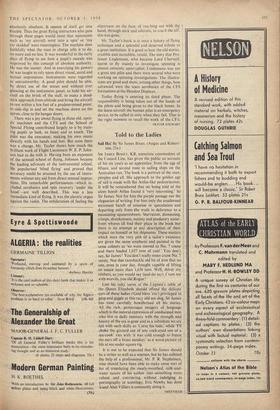Told to the Ladies
Sail Ho! By Sir James Bisset. (Angtis and Robert-
. son, 21s.)
SIR JAMES BISSET, KB, sometime 'commodore of the Cunard Line, has given the public an account of his six years as an apprentice, from the age of fifteen, and second mate in sailing ships on the
Australian run. The book is a portrait of the man, pimples and all. His approach to the golden age of sail is made with flat Attlee-HU pedestrianism.
It will be remembered that on being told of the atom bomb Attlee found it 'very interesting.' So Sir James. Not for him the purple passage nor the elegancies of writing. For hint only the unadorned statement bereft of emotion or speculation and departing only from She truth in deference to a nauseating squeamishness. Starvation, dismasting, crimps, drunkenness,. mutiny and predatory water- front whores 'all find their place in the book but there is no attempt at any description of their impact on himself or his shipmates. These matters which were the very pith of 'a sailor's existence are given the same emphasis and painted in the same colours as 'we ;were moved to No. 7 crane and there loaded 1,637 tons of coal.' You don't say, Sir James! You don't really mean crane No. 7 surely. Not that ramshackle old bit of iron that no one, even in your day, thought, capable of lifting an ounce more than 1,636 tons. Well, shiver my timbers, as you -would say (and do say). Cram me with weevils,-you Old Rogue!
Lest his salty yarns at the Captain's table of the Queen Elizabeth should offend the delicate ears of those ladies ('O:A bless 'cm') privileged to 1
.gasp and giggle at this racy old sea-dtig, Sir James has most carefully bowdlerised all his stories. All the rich, picturesque imagery of language which is the natural expression of uneducated men
who live in daily intimacy with the strength and beauty of the sea is gone and as a SUbStitute we air fed with such skilly as 'Curse his hide,' While Tit choke the gizzard out of any cock-eyed son of a sea-cook' vies with 'it was cold enough to freeze the ears off a brass monkey' as a word-picture of life at sea under square rig.
It is not to be expected that Sir James should he a writer as well as a seaman, but he has enlisted the help of a professional, Mr. P. R. Stephensen, who should have been able to make some sort of list of translating the mealy-mouthed, milk-and-
water nature, of his author into something more robust and convincing without indulging in pornography or scatology. Eric Newby has done it and Alan Villiers is constantly doing it.


















































 Previous page
Previous page